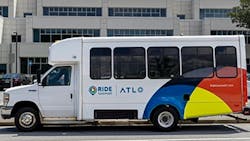Gwinnett County Board of Commissioners approves notice of intent to call for referendum for $17 billion transit plan
On Jan. 16, the Gwinnett County Board of Commissioners approved a notice of intent to call for a referendum regarding a $17 billion transit plan that focuses on improving public transportation in the county. The Gwinnett County Board of Commissioners is hoping to put the transit expansion proposal on the ballot come November.
“This is a necessary step in our transit planning process that sets the stage for us to place the power in the hands of our residents to determine the future of transit in Gwinnett,” said Gwinnett County Board of Commissioners Chairwoman Nicole Love Hendrickson. “Over 18-months, we received input directly from our residents, business leaders and municipalities and the result is a transit plan that enhances access to job opportunities and education, improves health and well-being and fosters economic development through enhanced mobility options.”
In 2020, Gwinnett voters voted no on a prior referendum that would have included expansion of Metropolitan Atlanta Rapid Transit Authority (MARTA) in the county.
The current proposal, which was approved by the board in September, does not include any MARTA expansion in Gwinnett County and would reconfigure and extend bus routes, adding high-frequency buses and a bus rapid transit line from Doraville to Lawrenceville, Ga. It would expand on-demand microtransit to cover the entire county within the next 10 years and would create express routes to Hartsfield-Jackson International Airport from the Mall of Georgia and Snellville. Transit services would, for the first time, operate on Sundays. A network of transfer facilities would provide new amenities, including real-time route information and bathrooms. Additional projects in the plan include county ride, quick ride, rapid ride and new transit transfer facilities that allow for greater connectivity and mobility across the county.
“The collective voice of our community may soon take center stage,” said Gwinnett County Board of Commissioners Vice Chair and District 1 Commissioner Kirkland Carden. “This pivotal moment will give each resident the power to shape the future of mobility and the broader trajectory of Gwinnett County as a whole. It's a unique opportunity for everyone to leave a lasting mark on our shared tomorrow.”
“I’m thrilled that we continue to have unanimous support for this plan,” said Gwinnett County Board of Commissioners District 2 Commissioner Ben Ku. “I’ve been working towards this for years and I’m so happy we finally have a plan where I can say you will be able to get anywhere in Gwinnett without a car. Our transportation department has done an excellent job listening to community feedback to come up with a revolutionary and comprehensive transit plan to create a system that will benefit every single person in Gwinnett.”
In the next steps, the county will submit the referendum project list, taken from the Atlanta Regional Transit Plan to the Atlanta-region Transit Link Authority (ATL) for approval during the ATL Board meeting on Feb. 1.


